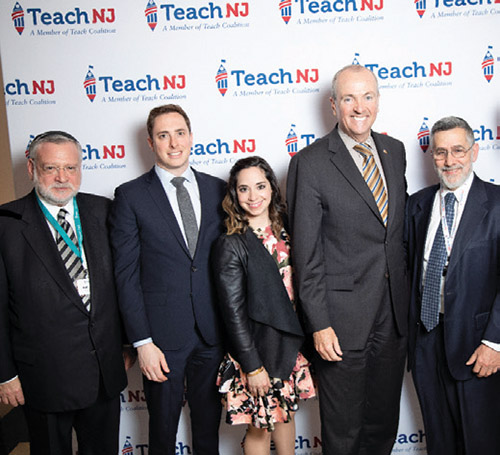
For the second time in 2019, the Teach NJ organization scored a major legislative victory. On Friday, August 23, New Jersey Governor Phil Murphy signed into law S. 2660, which creates a grant program to help fund the salaries of public school teachers of science, technology, engineering and mathematics (STEM) who also teach these subjects in nonpublic schools.
Senators Paul Sarlo (D-36) and Vin Gopal (D-11) sponsored the bill in the New Jersey Senate. Assembly Members Joann Downey (D-11), Eric Houghtaling (D-11) and Gary Schaer (D-36) sponsored the bill in the New Jersey Assembly. The newly signed legislation provides an appropriation of $5 million to support the salaries of STEM teachers in nonpublic schools.
Teach NJ is the New Jersey branch of the Orthodox Union-affiliated Teach Coalition, a network that builds alliances among different faith communities and advocates for increased state aid for nonpublic schools. Teach Coalition is active in California, Florida, Maryland, New Jersey, New York and Pennsylvania; it recently opened a new outpost in Ontario, Canada.
In January, Teach NJ celebrated as the governor signed a new bill, at a public event at Yeshivas Beis Hillel in Passaic, to double state funding for security in nonpublic schools. Since Teach NJ was founded in 2015, it has secured an additional $100 million in state aid for nonpublic schools.
Asked how Teach NJ reached this second major legislative accomplishment in eight months, Teach Coalition’s Director of State Political Affairs Dan Mitzner was quick to credit Teach NJ’s coalition members and community activists across the state. “We’ve been working with day schools, Jewish community leaders and our partners in Christian and Islamic schools for months, to advocate for this state support,” said Mitzner.
“The need is borne out across the state. The governor has stated that he wants to create an innovation economy in New Jersey and STEM education is a major part of that. Our activists, thousands of parents and educators, championed the need for nonpublic schools to be part of this drive and it had great ramifications.”
Rabbi Daniel Alter, head of school at the Moriah School in Englewood, commented on the signing of the new bill: “We built a beautiful new STEM lab a few years ago so that our students could excel in this field. We are thrilled that the governor also recognizes the importance of a strong STEM program in nonpublic schools, preparing the next generation of leaders in New Jersey. We intend to use this funding to ensure that Moriah students play a role in propelling our state of New Jersey to become a leader and innovator in the fields of science and technology.”
Tova Renna, president of the Rabbi Pesach Raymon Yeshiva in Edison, stated, “We are so excited for the potential that this new STEM funding will bring, whether in supplementing our current STEM classes or allowing us to expand our offerings. We are grateful to Teach NJ for continuing to support initiatives to improve funding for our schools, as well as to our legislators who supported this bill.”
Mitzner noted that the next stage with the newly signed legislation is to work with the New Jersey Department of Education to develop the rules and regulations of how schools can apply for these funds and how they will be allocated.
A small wrinkle in the legislation, as noted in a statement issued by the governor on the signing of the bill, is his Executive Order in late June “to place certain items of appropriation representing discretionary spending into reserve, to ensure that the state budget remains in balance.” The governor’s statement on signing S.2660 adds: “the Director (of the New Jersey Division of Budget and Accounting) shall review the appropriation contained in this bill to determine whether this appropriation should be reserved, based on the factors outlined in the Executive Order.”
Mitzner sees the governor’s directive on the appropriation for S.2660 as favorable, in that it gives the New Jersey Department of Education “time to develop the critical infrastructure to manage the grant program, before the dollars are allocated.” He stated that Teach NJ anticipates that the funding will be available to nonpublic schools in Spring 2020.
The Orthodox Union thanked New Jersey legislative leaders for their support for this very important legislative victory for nonpublic schools. “We are extremely grateful to Governor Phil Murphy, Senate President Steven Sweeney and Assembly Speaker Craig Coughlin for making the STEM education bill a reality,” said Orthodox Union President Moishe Bane. “We would also like to thank Assembly Member Gary Schaer for leading the effort on introducing and passing the STEM bill and for being a stalwart champion of our mission to secure equitable funding for nonpublic schools. Through the joint efforts of our partners in advocacy, we have made history for our schools in New Jersey.”
Speaking about the importance of this bill, Senator Gopal stated, “Our classrooms are the engines of New Jersey’s economy. If we want New Jersey to be able to take advantage of expanding STEM industries five, 10 or 20 years down the line, we need to start investing in our students today.”
Assemblyman Houghtaling remarked: “Some of today’s best-paying jobs are in STEM fields like chemical engineering, statistics or computer programming. Our kids deserve the best shot at success we can give them, and this funding will expand their opportunities even further.”
Assemblywoman Downey added: “A STEM education can do so much to help a child expand their creativity, logic and problem-solving skills. With this new law, we can help our teachers continue the incredible work they do every day to inspire and educate the children they support.”













